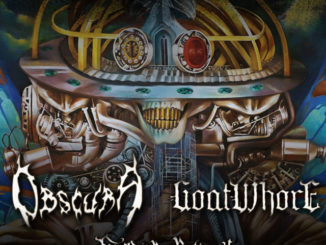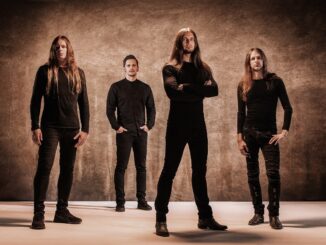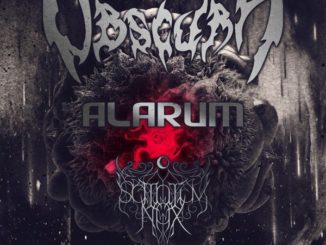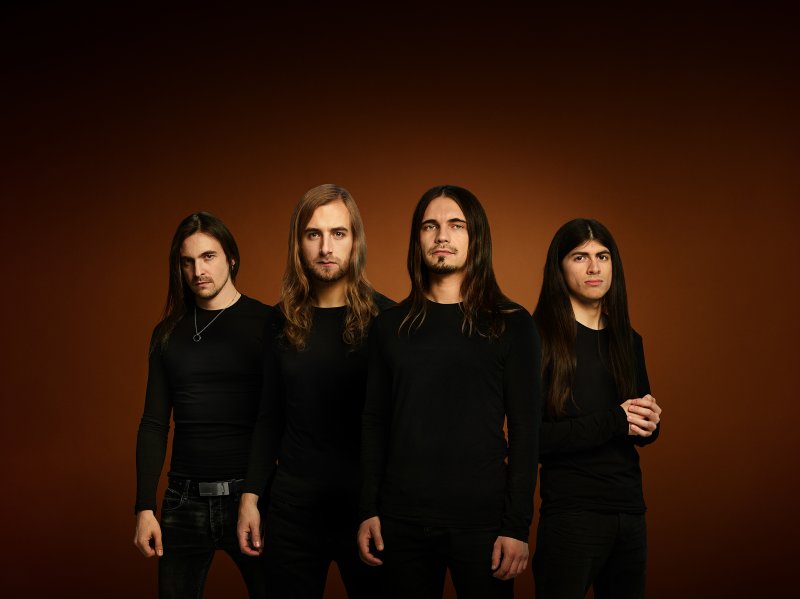
Obscura are a German technical death/extreme metal band whose intricate and mindbending riffs push the limit of musical complexity. With 3 albums in and a fourth, “Akroasis”, to be released on February 5th, some of which are tied in together as a concept, the band are looking to turn more heads in 2016 with the new material and some touring during the year. We had a chat with vocalist and guitarist Steffen Kummerer to talk about the new album and some interesting ideas surrounding the new songs.
Steffen: How are you doing?
Andrew: Very well! How are you?
Steffen: Pretty decent, pretty cool here. A lot of promotion, a lot of good reviews [that] we are getting today and in the last week. A lot of things to do but all positive vibes and good feelings so far, all good!
Andrew: That’s good to hear! Do you pay much attention to reviews and stuff like that?
Steffen: Yeah of course we all read that and we are kind of curious how fans and press react to what we are doing. We finished the album half a year ago, we sent it to the record label and that’s it and now 6 or 7 months later, we finally get some feedback from people who are not totally into the band. But it’s pretty interesting though.
Andrew: Well obviously the album is coming out very soon and we had a preview of the album ourselves and it sounds fantastic! It’s probably one of the better ones that you have done so far but from your perspective, what can you tell us about the songs and how it all came together?
Steffen: Well first of all, thank you! It’s great to hear that you like it. Compared to the previous albums, we changed a lot of different things, starting with the production, how to actually write songs but also how to mix the album at the end. So where do I start? I think the album itself was completely different to “Omnivium” for example since this album and the previous album “Cosmogenesis” had been written only on sheet music before we had it into the studio. It was somehow pretty comfortable since none of us live in the same city so we basically share our ideas by the internet, we have our own server, we have put our own extensions on it nowadays but back then we only sent over the midi files. The point is the computer can play everything but when you’re sitting in the studio and you need a 5th, 6th, 7th finger at a point when you only have 4 fingers to play on a guitar, then it’s going to be a problem. I mean we always fixed it, we simply rearranged a couple of minor things but there was one of those small things that I wanted to change a little but but also some parts seemed like a bit constructed in my opinion. So what we did this time, and it’s moving a little bit backwards, we simply made demos of all songs. And at the same time we wrote down everything on sheet music, put all of this information onto a server and then everybody was able to go through the song, add something with a guitar like re-record something, add some solo, some additional lines, some acoustic guitars, write everything down on sheet music and there we shaped each and every song and went wth the complete pre-production we did and into the studio. I think this helped us, from my perspective at least, to make all those arrangements a little bit more fluent. It sounds a little bit more like one big thing, at least that’s my opinion.
When it comes to recordings, I learned a lot during the last 10 years in terms of engineering and also acoustics overall. So we went [on] the long road of working only with analog equipment. Even to capture the live feeling of the band, what we did was only use our live gear in the studio so it’s the exact drumset that our drummer is playing live, it’s the exact Amp I play at every show, it’s the exact guitar I’m playing [for the] last 7 or 8 years live. This is what I recorded the rhythm guitar tracks with and this is sounding more like where we captured the identity of the band in terms of sound. But on the other hand I was also looking for a more broad and bright mix, on the past albums we recorded all the drums in Woodshed Studios [which is] the studio where we always work. The producer V. Santura, we’ve co-oporated with since 2003, he’s almost like the 5th band member and he has a very nice studio and recording booths which you can also fit a drumkit in. But it’s very hard to use room acoustics from a very small room for the drums that we are looking for, so what we did was hire an external studio called Dreamsound studios in Munich. They have a very big recording room where they usually record bands as a whole, like Jazz trio’s or string ensembles, big choirs. So what we did was put the drums in the middle and made a double overhead out of that and that’s what we used especially in the silent parts. So you don’t need all that for the blast beats or that super high speed stuff, we looked for more dynamics within the sound in the silent parts. For example the acoustic guitars going through a small interlude shining through the song, I was looking for a more natural, organic sound overall instead of a definite production like we did in the past which is simply ripping your face off [laughs]. I was looking more of a kind of 3D mix so we not only panned guitars left and right, we also worked with delay lines, put those instruments back and forth, at least in terms of the acoustics. This was very interesting and in the end I am very happy with the result, it sounds a little bit different than the common definite productions. Some people like it, some don’t but I’m very happy, this is what we wanted to do and I’m very happy with the production. Of course it sounds a little bit different than the previous album but I hope you can still hear which band is playing [laughs].
Andrew: Yeah you have definitely kept the trademark sound of Obscura but you are absolutely right in saying that sonically speaking, this album does sound on the next level kind of thing. It really sounds like you really focused on the production side of things this time around.
Steffen: Absolutely. We also tried to split somewhere in the process of writing songs, arranging everything. Basically separating this whole creative process from performing and recording everything in the studio so we made everything prior to entering the studio so there was basically no try around in the studio. We even met for 2 days to go through all the vocal arrangements before entering the studio to just focus on the recordings and the performance in the studio, and this was something that really helped us. It may not work for every band but I’m super happy and you know, we Germans, we try to be efficient [laughs].
Andrew: [laughs] Well it works very well for this album. One of the things that I did want to ask you was the album title, “Akroasis”.
Steffen: Yes it is old Greek and it means close listening or hearing. The story behind that is it’s based on a book that’s also called “Akroasis” and it was written by Hans Kayser, an old astrophysics professor from Switzerland and he worked his whole life with the idea of the harmony of the world. So hearing and all those astrophysics view is somehow merged into our music and especially the lyrics, so I brought ideas I worked with on the last 2 albums into it as the harmony of the world concept. It’s basically made within 3 levels, the first you have the astrophysics point of view, the second is the philosophy point of view and the third is the religious point of view. So the 3 entities which is something I’m working with since the last album and “”Akroasis” is part of the album concept we started with “Cosmogenesis” and “Akroasis” is album number 3. It’s more or less based on the idea of your own consciousness and you read the story within all 3 entities on different levels and I was playing around with that. To make it short, that’s the reason this album was named “Akroasis” in the end. It’s like if you are making a TV show and call it “watch it”.
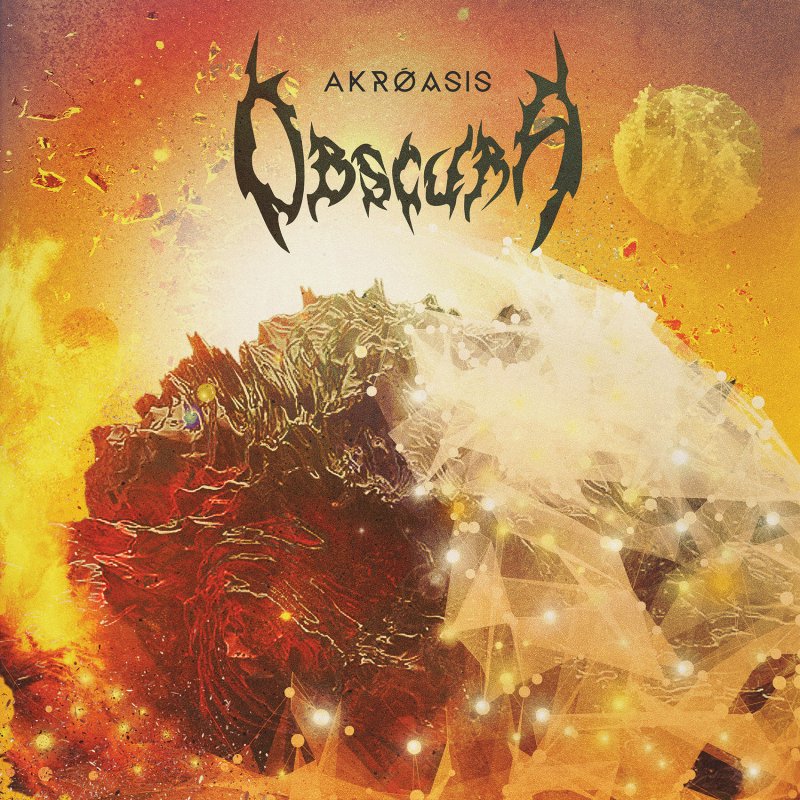
Andrew: Yeah it captures the whole album really well because as mentioned before, sonically it sounds great and I thought maybe the album title had something to do with the production of the music.
Steffen: Well in some way. I mentioned this bit of the end thought of the harmony of the world and he worked back in the day with an instrument called HarmoniComb, are you familiar with it?
Andrew: No I can’t say that I have heard of it before.
Steffen: OK that’s very polite [laughs].
Andrew: [laughs].
Steffen: It’s actually a big wooden instrument, as big as a couch. It’s 2 metres by 1 metre by 1 metre and you use it for psychotherapy. I’ve been working at a university for some time as a lab engineer and we had one of those instruments and I saw so many links so we had to use it, there was simply no other option not to do it. On this big wooden piece, there are 34 strings all tuned to the same tone and what you are doing with this is you lay down as a patient or whatever and you lay your head on the wood – as I mentioned, it’s like a couch so you are laying into this instrument – and then you hear basically with your bones. This is super bizarre, I tried it myself a couple of times and if somebody plays those 34 strings, you can hear and can basically feel the sound. It’s very interesting and as I mentioned, you use it for psychotherapy, working with kids or sometimes in a psychotic asylum and I thought it was very interesting. This is actually the idea where the music comes together with all of those lyrical content and we used this in the songs “Weltseele” and “The Monist” and there’s even a bonus track with that, it was very interesting. When we recorded this instrument, I don’t know how long the sustain was, but at the university there was a big clock and every minute you had a [makes ka-koom sound] and we had a sustain of exactly 1 minute with this thing because after that, we had a [makes another ka-koom sound] on the microphones [laughs].
Andrew: Wow that’s a very interesting instrument, it sounds quite elaborate but kinda simple at the same time. I can’t say I have ever heard of it before but it’s a very cool thing to add to the album.
Steffen: Yeah it was more like a coincidence that we had this instrument and we were able to use it, but the concept itself is pretty simple. But if you play it and hear it, it sounds so brutal that every djent 8 string guitarist can go home I can tell you.
Andrew: [laughs] Just on some other things musically speaking, you guys have always been quite technical and creating intricate stuff but on this one it seems like you have really pushed the limits so to speak. Was it really difficult to create a lot of these songs in the beginning?
Steffen: I think every song was created a little differently and took more or less time than the others so it’s hard to say. But we clearly focused on writing more on the songs on the one side, on the surface if you are listening to the album [while] working or driving a car, it works but if you’re listening from an analytical point of view, there’s a lot of things happening under the surface, especially in the rhythms. What we wanted to do is reduce the high speed sections a little bit just because we figure during the last [few] years, the songs above 250bpm don’t sound good live. I mean you can play a small part of that high speed but if you have 4 or 5 songs in a row playing high speeds, most of the people in the audience are getting tired and it’s also not too funny for us. So to keep it more interesting and to simply having a better sound live, we reduced the speed a little bit to only 230bpm! This is still high speed but not over the top and to make it up, we have been focusing more on purpose on the rhythmic. So we have Sebastian Lanser our new drummer and he is working all the time, so multi-layered rhythm sections. Sometimes he plays 7 against 5 against 15 as an opening track or something like that but this is under the surface. It sounds very fluent when you hear it, like a metal band, but if you’re getting into it, and we’re about to release a drum tab book because a couple of people asked for it, then you can basically read what this guy is actually doing there. And together with Linus (Klausenitzer, bass) and the whole new rhtyhm section that we have in our band, it’s the reason why it sounds a little bit different. Everybody is interpreting rhythms a little bit different or interprets how to play to a riff in a different way and this was very interesting. I think preparing the album took way longer than say “Omnivium” since we had all of those different steps with the pre- production and arranging everything and in the end, we had the same musical value in my opinion but we executed it a little bit different and a little more laid back. This is from my perspective, something you can hear sometimes on the album, there are some parts where you have some time to breathe. Some acoustic interludes where, OK [breathes out] and then the next, a blast beat is ripping your head off [laughs].
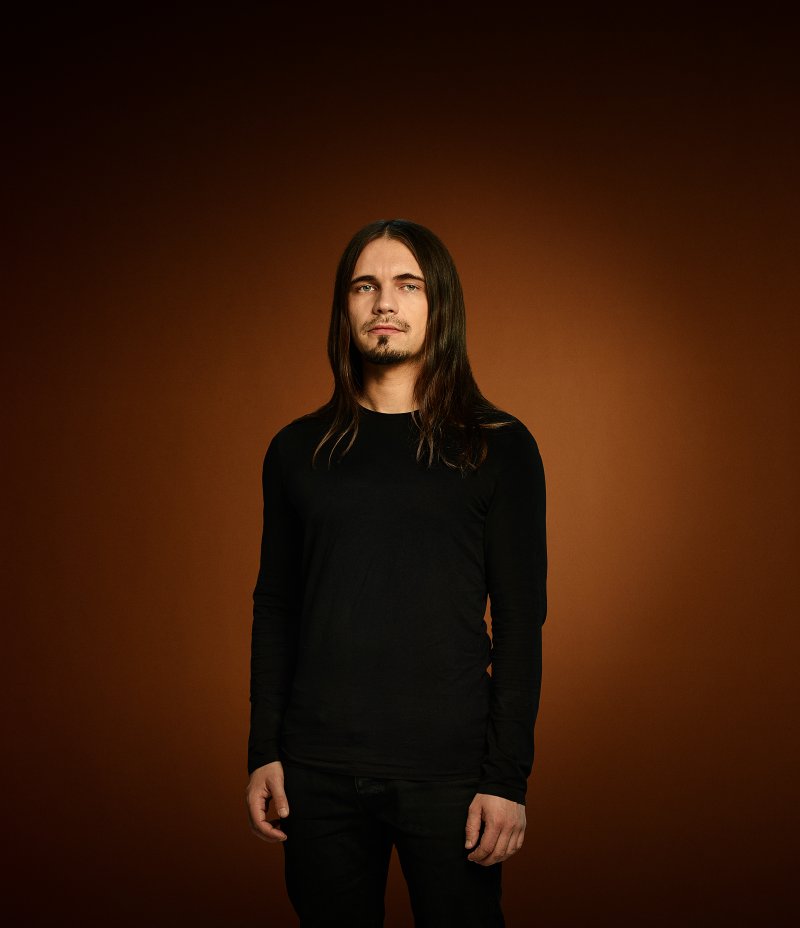
Andrew: Well that kind of stuff creates some dynamics in the songs which is always nice to see. You just mentioned a couple of people that are new to the band, how is that all working at the moment? Has it been going very well?
Steffen: So far it’s been pretty good. We are preparing a European tour for March and April at the moment and we’re booking a couple of festivals around summer. In the end we are booking the whole year with gigs and we’re about to get our live set together so life is very well. As I mentioned, we got a couple of good reviews and nice features so far and this is pushing the life into the band so I’m happy! With good people in the band, it’s always a pleasure to hang out with them. I mean playing in a band is not only staying in the rehearsal room and everybody plays his parts or you record an album once, it’s going on tour for 1, 2 maybe even 3 years that’s a completely different thing. You have to have a common feeling and a good vibe and if you’re sitting 30 days in a row in a stinky little nightliner, you have to have a good vibe with the band otherwise it won’t be fun.
Andrew: Yeah absolutely, chemistry is obviously a very important thing for a band. What kind of stuff are you expecting to do on the tour? Are you the kind of band that focuses more on the newer material or do you like to mix it up a bit on the setlist?
Steffen: Well with supporting Death DTA, we get I guess 50 or 60 minutes. We try to make something like a best of setlist but we’re working on a couple of headliner shows and a bigger tour by the end of the year and I guess when we have more time, let’s say 70 or 80 minutes, then we simply mix it up every night. I don’t want to play the same songs over and over again and the same goes to our fans, it’s a small scene and I imagine most of the people that are coming to our show have been able to see us somewhere at a festival or on a previous tour, so I guess they will also be pretty happy with different songs from different albums. So we’re not only playing songs off “Akroasis” but also we will bring in a ‘new’ track for us to play that we didn’t play live in the past. We try to keep it interesting for example, if we would do a second show [in the same place], I would not play exactly the same live set, that would be boring for everybody.
Andrew: What about the performances of the songs themselves, have some of them changed a bit over the years?
Steffen: Good question. You are referring to the old material?
Andrew: Yeah the older material.
Steffen: Sometime ago we tried to work with songs from the debut album “Retribution” but it didn’t feel right. We tried to spice it up a little bit, somehow make a new version out of the songs but it didn’t feel right since the songs have been written that way and they have to be played that way otherwise it’s simply a different song in my opinion. On the other hand, if a different drummer plays the lines of a previous drummer, of course it sounds a little bit different but I would say 95 percent we play it exactly as we did in the past. I hope we’re getting a little tighter these days but that’s a different story!
Andrew: Well as I said, the new album sounds fantastic so congratulations on the new material and I hope you guys do really well on the tour. Maybe someday you guys can come down to Australia and do a tour down here.
Steffen: I’ll tell you what, we are exchanging dates right now.
Andrew: Oh right ok!
Steffen: That’s a thing that I want to achieve with the band, playing in places we haven’t been visiting so far. Australia we’ve been talking about for I guess 5 years but it never worked out. There was a big touring festival which was just cancelled a couple of weeks ago, I haven’t read the whole story but it seems like it was a big let down for the whole music scene in Australia.
Andrew: Pretty much. It (Soundwave Festival) was like the equivalent of maybe the Wacken Festival or something like that, it was the biggest metal festival in Australia and it toured around nationally. Unfortunately it died last year and it was the only thing that we had but there is a new one coming up which we are hoping will be launched so fingers crossed.
Steffen: Well who knows, we are working on a couple of tours and we try to combine for example, Asia and Australia and we hope to have something to announce in the next couple of weeks but I cannot promise something I cannot keep. But we don’t forget!
Andrew: Can you give me any idea when you would be coming, if it were to happen at all?
Steffen: Yeah September we are talking about.
Andrew: OK cool. We would love to see you down here because especially with your type of music with the progressive, technical kind of stuff, there’s a lot of fans here who love that kind of thing so you guys would do very well over here.
Steffen: There are a couple of great bands from downunder like Alarum, not sure if you know them?
Andrew: Yeah I know them.
Steffan: Fantastic band and I tried to bring them on a European tour, for a couple of years they were on the to do list. The same goes for Psycroptic, they are pretty well known.
Andrew: Yeah definitely. We got a fairly healthy music scene over here but it’s always great to see some international bands come down and do their own tour, absolutely. Hopefully it can happen, good luck on that and thanks for your time today, it’s much appreciated.
Steffen: Thank you very much for the interview .

